- Home
- K. J. Emrick
Doors, Danishes & Death Page 9
Doors, Danishes & Death Read online
Page 9
“That wasn’t my doing,” Quinn said, waving away the suggestion. “Although I admit I didn’t argue the point. Chief Santimaw suggested the course of action. I and the selectmen had nothing to do with it.”
“You could have ordered him not to.” Cookie stood up. She didn’t like feeling like she was being lectured to. “You—either of you, Archie—could have told him what really happened so that Jerry’s job wouldn’t be in danger.”
“Oh, Cookie,” Quinn sighed. “His job isn’t in danger. It’s a suspension. His chief thought he did something improper, and took steps to discipline Jerry. That’s an internal matter. Now, I know he’s your fiancé, but that doesn’t give you the right to butt into the situation. This is an internal police department matter.”
Archie shrugged, happily munching on his Danish. “I did have a talk with Chief Santimaw,” he said. “Rick didn’t want to listen to anything I had to say. He gets that way sometimes. You know how he is.”
Cookie most certainly did. Rick Santimaw was a bloated politician wearing a policeman costume, in her opinion. He was fine when it came to organizing the department or getting state and federal funds for equipment, but as far as having a sense of what real police work entailed, Cookie had always found the man to be sorely lacking.
“Look, Cookie,” Quinn said in a milder voice. “I know this has been a shock to everyone. Especially coming now, during the centennial like this. That’s why I wanted to keep this quiet, rather than hurt the Merriams or make our town look bad, but now that everyone has heard that we think the skeleton in your cellar was Jozebus Merriam, grandfather of our most honored citizen, now that we have a murder that directly ties into why our town is even named Widow’s Rest, for the love of God…”
She stopped, shaking her head and pacing back and forth. She was too frustrated to continue, apparently. It was Archibald who explained the rest of it to Cookie.
“Now, after all that,” he said, “we expect the whole press conference to be about this hundred-year-old murder. It was supposed to be about our town. We were supposed to launch our new tourism agenda today, with the help of George and Batina, and now we’re pretty sure that message is going to get buried on page six because the whole dead body in a cellar thing is going to be their page one news.”
“Well, that’s certainly not Jerry’s fault—” Cookie started to say.
“No, of course not,” Quinn agreed, finding her composure again, “but he didn’t help our cause, either. All he had to do was stay away from George and Batina until we had confirmation from the state police forensics lab that the remains actually were Jozebus.”
Silence hung in the air, and in that silence Cookie caught on to what they weren’t saying. “You got the results of the DNA test already, didn’t you?”
Quinn pressed her lips together tightly, her dark complexion darkening further, and her deep brown eyes flashing. If she’d been expecting Cookie to just back off and give up the mystery completely, she had sorely misjudged her.
And she had to wonder. Was that why they had suspended Jerry? To keep him from investigating?
“The DNA results came in, yes,” Archibald confirmed. “The markers suggest that he is indeed related to George. The skeleton is definitely a man’s. Add that to the age of the remains, and the dates on the newspapers you found, and it’s an easy thing to conclude it really is Jozebus.”
“But you still don’t want to tell anyone,” Cookie asked flatly.
“No, of course not,” Quinn said, her voice a low hiss as she looked around at the other retirement home residents. None of them were paying attention to their conversation. Yet. “Releasing that information would just be fuel to the fire. Let’s just get through the next two days, and then after the celebration is over and our tourism won’t be affected, we’ll release all the information we have about this terrible murder. That is what would be best. For us, for the Merriams, and for the town.”
Cookie thought back to the long line of customers in her shop yesterday and had to wonder if letting this particular cat out of the bag would hurt tourism in town, or help. She understood what they were saying to her, but… “You don’t think word is going to leak out as it is? How many people know about this already, Quinn? George must have told his friends, and Batina too, and there’s no guarantee the state police officers who were in my shop to help Chief Santimaw’s people will keep their mouths closed. This is going to get out. You can’t convince all of them to stay quiet.”
“We know that,” Quinn said, checking her watch impatiently. “But in the meantime we can control the story and the information. When you get right down to it, Cookie, this is a hundred-year-old mystery that will never get solved and it really doesn’t matter who the killer was because the killer is dead as well.”
She turned to leave, believing that was the final word.
Cookie had one more thing to say. “What if the person who killed Jozebus was his own wife?”
The look that crossed the mayor’s face was immensely satisfying to Cookie. It was obvious that idea had not occurred to her. Archibald either, since he looked more shocked than Quinn did.
“That’s… that’s just nonsense,” Quinn finally said. “And scandalous. Cookie, if you breathe one word of that idea so help me, I’ll make sure that your bakery never has another permit approved again. Ever.”
“Quinn…”
“I’m serious, Cookie. This is serious business. Hester Merriam is the woman who inspired our town’s name and you want to label her as a murderer? We can’t let—” She looked around them again, and although they still had no one listening or watching, she stepped in closer to Cookie and lowered her voice even further. “We can’t let rumors start running around that might damage the reputation of Widow’s Rest. For now, you will let me and the town selectmen do the talking. Understand?”
She didn’t wait for an answer. With a native Mohawk goodbye, “Ó:nen ki' wáhi,” she left Cookie standing there and made a beeline for the door into the building.
Archibald stayed a moment longer. His eyes were serious under a creased brow. “You really think it was his wife who killed Jozebus?”
“Hester. Yes. The widow in Widow’s Rest. Who else?” she asked bluntly. “Someone had to leave him down in that cellar to die. It was him and Hester who ran the butcher shop. It was Hester who sold the business to Fran before it came to me. Fran certainly never knew there was anything under the building. So if Hester sold the shop without mentioning the root cellar, doesn’t it make sense that she’s the one who boarded it up?”
She saw the light come on in his eyes. “Oh, Cookie. This is not good.”
“It’s history, Archie. You can’t change it. Quinn was right about that part, but we shouldn’t be trying to hide it, either.”
“This isn’t hiding it, necessarily. It’s just… we have a responsibility to the town, and…”
He trailed off, unable to finish his thought. Rubbing at his forehead he left her there too, rushing to catch up to Quinn. They had a full day ahead of them, Cookie knew. She hadn’t planned on dropping this idea in their laps. All she had wanted to accomplish by talking to Quinn was to get Jerry’s suspension lifted. She might as well have tried separating a yolk from the eggwhite with colander. It would’ve been just as effective.
Of course, she hadn’t expected Quinn’s hostile reaction either. Yes, the idea of Jozebus being murdered by his own wife was upsetting but was it really worth making threats over? She didn’t think that she’d ever seen Quinn this upset, and that included the time the town’s only hairdresser up and quit with no warning. Or the time one of the selectmen got caught skimming town funds to pay for his swimming pool.
Why was she so upset now?
There were only three Danishes left in the box. Cookie took one out, and munched on it as she sat there, puzzling through a mystery from the past. The sun was warm, and the breeze was nice, and Cookie could allow her thoughts to wander.
She was still sitti
ng there and thinking when her cellphone rang. Her Danish was long gone, and the morning was getting away from her. She checked the time on her phone before she answered it and nearly kicked herself for staying here this long.
It was Jerry calling. “Hi,” she said, trying to sound cheerful for his sake, regardless of how badly her conversation with the mayor had gone. “I missed you. Where are you?”
“Uh, at your bakery, actually. I thought you’d be here.”
“Sorry,” she said, bouncing up out of the chair. Her car was parked out front. “I can be back in five minutes. Wait for me there?”
“Actually, can I meet you at the library?”
Cookie stopped. “The library? Whatever for?”
“I want to get another look at the newspapers from the cellar,” he said.
“The newspapers? They got taken to the library?”
“Well, no.” A door closed on his end, and now his voice had that hollow echo to it that told her he was in his car. “They got taken to the State Police forensics lab but you know what libraries have?”
“Microfilm!” Cookie saw where he was going with this now.
He chuckled. “Nobody uses microfilm anymore. You’re showing your age.”
“Shush,” she told him, feeling the heat from his teasing. “I know technology has moved on from those bulky machines and the little strips of film. We’re going to look at the scanned copies of the newspapers.”
“Yes, we are. Meet you there?”
“All right, sure…but why are we looking at the newspapers? I mean, are we even going to know which papers were there and which weren’t?”
A beeping sound was followed by his engine starting. “Well, I actually just want to look at one edition. The one you found about the fire in town.”
Cookie started rushing through the hallways to the front door again. “You have a theory, don’t you? About the murder, or the man who got into my shop?”
“Well,” he said. “You’ll just have to meet me at the library to find out.”
***
The Widow’s Rest library was just up the street from the retirement home, right next to the post office, so of course Cookie got there first. The red brick building had been built in the 1950s, back when all municipal buildings were built for function instead of aesthetics. It was a one story cube, with two windows on each side and a door at the front and the back. Cookie didn’t spend a whole lot of time here but she had been known to wander through if she wanted to find a book to distract her.
Although, she couldn’t remember the last time she could just sit and read a whole book. There were two in her bedroom above the bakery now, both gripping romance novels, both of them only half finished. She had plenty enough to occupy her time in her real life. This mystery of the dead man in the secret cellar, her upcoming wedding with Jerry, and a business to run. Not to mention a teenage granddaughter to watch over. Yes. Life was full.
The library only had the one employee. It was only open six hours a day, eight on Saturdays, and it was closed on Sundays. Kimberly LaShomb had been the librarian here for years now and she had the place running so smoothly she didn’t need any help with it. She was the quintessential small town librarian, appearing to have walked right off the pages of one of the books that surrounded her on the rows of freestanding metal shelves. Tall and thin, with thick round glasses that amplified her hazel eyes, and a honey blonde ponytail, she favored baggy jeans and loose t-shirts that did nothing to flatter her. Bookish and shy, she was one of those people you knew lived in your town but hardly ever saw.
Even though Jerry had teased her about it, Cookie knew the town had transferred all of their microfilm over to a digital format a few years ago. Much less storage space involved. That meant reading old newspapers was a simple matter of loading a CD into a computer and scrolling through the images. She went up to the long front desk just inside the front door, the lacquered wood surface gleaming under the fluorescent lights, and then waited while Kimberly finished stacking books to be returned to the shelves. When she was done with that she turned to Cookie with a little smile and folded her hands in front of herself. “Hi Cookie. What brings you in here today? I thought you’d be down at the town park for the celebration.”
She looked around at the empty library, and added in a soft voice, “Like everyone else.”
“I should be, I suppose.” Cookie enjoyed the town events, to be sure, but under the circumstances it was more important to be doing what she was doing. “Jerry will be joining me here in a few minutes. We were hoping to get a look at the back issues of the Herald.”
“Sure. We can do that. Just need to have you sign the sheet.” She took a clipboard from a wall peg behind her and turned it around for Cookie to sign. She seemed happy just to have something to do. “You just need to put down the date, and which years you want to look at.”
“Well, that depends. Exactly what year was the fire on Main Street?”
Kimberly adjusted her glasses. “I thought everyone knew that. The fire started in December of 1912. It would be another two years before things got back to normal. There were lots of news articles about it all during that time. I’ve read several of them myself. It’s all very interesting. Actually, I thought of writing a book about it. Oh. Sorry, that’s not what you asked, is it? I just get so wrapped up in the history of this town sometimes… okay. So what you’ll want to start with is the December 1912 editions. You sign that sheet and I’ll go get them for you. They have to stay here, okay?”
Odd woman, Cookie thought to herself. Nice, but odd. In the movies those were the ones you always had to watch out for.
She filled in her name and today’s date, and then the year and month of the papers she wanted to look at. Then she laid the pen down on the clipboard. It rolled halfway down the page from the top, and then stopped just above where she had signed.
Above her own name was another one that she recognized. Beside the name was a date range for newspapers that was almost identical to the ones she had asked for.
“You’re not the first one to ask for these,” Kimberly called out from the back room. “Had someone come looking for the same thing yesterday.”
“So I see.” Cookie’s finger traced along the line with the other person’s name on it, wondering what it meant.
“That’s odd.” Coming out to the desk again, Kimberly shuffled through several plastic cases of computer CDs, all labelled with dates hand-printed on stripes of white tape. “You aren’t going to believe this, but the month of December in 1912 is missing. The cases are still here but… they’re empty. I can’t believe it. He must have taken them.”
Slamming her hands down on the counter, Kimberly’s eyes momentarily flashed red. Then, in the next breath, she was calm again. “That makes me so mad. People need to respect their library. This information is here for everyone to read. Don’t they understand that?”
Behind her, Cookie heard the library door open. It was Jerry. He was wearing jeans and a t-shirt, which just seemed to drive home for Cookie the fact that he’d been suspended while trying to figure out the mystery of the dead man under her shop.
“Hey. There you are.” He went to put his arm around her shoulder but then stopped as he saw the look on her face. “So, uh… what did I miss?”
Chapter Six
“I can’t believe this. I just can not believe this.”
Jerry drove them in his car maybe a little bit faster than he should have on the streets of their little town, considering that it was full of people now and some of those people didn’t seem to understand that they should stay on the sidewalks. On the other hand, they did make it to their destination in a few minutes rather than the fifteen it should have taken with all the detours around streets closed for the celebration.
“Jerry,” Cookie warned. “It’s not going to do either of us any good if you go in there and yell at him.”
“It will make me feel better. He took those newspaper records.”
“And what will yelling at him accomplish?”
“I just told you,” he said, slowing for the turn. “It will make me feel better.”
“And quite possibly,” she reminded him, “make you lose your job permanently.”
“Fine.” He parked the car in a spot, and then shut the engine off. “I won’t yell at him. But he is going to explain to us why he was looking at the records of the newspapers for that year, and he is going to explain why he kept the CDs.”
“Maybe you should let me talk to him,” Cookie offered. “We’ve got a lot of notes to compare, you and me, and it will be hard for you to do that from jail.”
“Fine,” he said again, not sounding at all like he meant it. Then they got out of the car together.
At the police station.
Cookie had wanted to tell Jerry everything she had found out so far, everything that she suspected, but there just hadn’t been time. She needed to tell him about Hamish and his black eye and the way she believed he got into her apartment. She needed to tell him about her talk with George, and her talk with Mayor Fieldberg, and all the rest of it.
She would have, too, but when they saw Chief Santimaw’s name on that sign out sheet at the library and realized it was him who had the newspaper records, Jerry hadn’t much been in a talkative mood.
The police department was built at the same time as the library, or at the very least it had been designed by the same architect. Brick and mortar, one single story, with fluorescent lighting and cheap stick-on floor tiles. The front door was glass in a metal frame with a frosted six-pointed star in the middle. Just inside was a small lobby with a green plastic couch and a corkboard pinned with posters about the evils of drug use and the good that neighborhood watch programs can do. Usually someone would have to ring the little bell at the service window to get an officer to buzz them inside. Lucky for Cookie, she was with someone who had a key.
Suspended or not, Jerry went right to the inner door, ignoring the words “Employees Only” spelled out clearly in block letters, and jammed his key in with a sharp twist. He was full of thunder and Cookie was just glad there was no one inside at any of the three desks. The celebration party was still going on, she reminded herself, and that meant the officers working today would all be out keeping things running smoothly around town. The inside of the office was as quiet as a tomb.

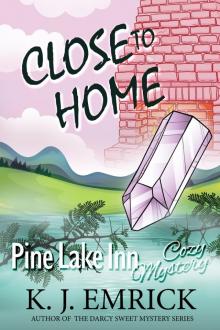 Close to Home
Close to Home Dream a Little Dream
Dream a Little Dream Careful What You Witch For
Careful What You Witch For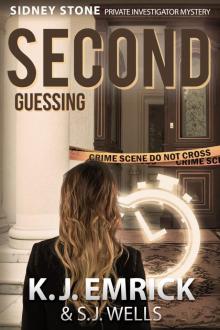 Second Guessing
Second Guessing 21 Death Takes a Letter
21 Death Takes a Letter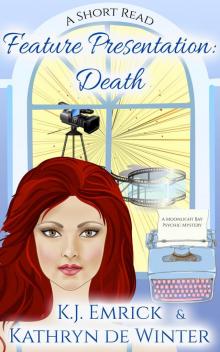 Feature Presentation
Feature Presentation Bottled Up
Bottled Up A Darcy Sweet Mystery Box Set Seven
A Darcy Sweet Mystery Box Set Seven Manor of Death--A Short Read
Manor of Death--A Short Read Son of a Witch
Son of a Witch Darcy Sweet Mystery Box 1
Darcy Sweet Mystery Box 1 Witch I May, Witch I Might
Witch I May, Witch I Might Death on the Rocks--A Short Read
Death on the Rocks--A Short Read Little Moments
Little Moments A Friend in Death--A Short Read
A Friend in Death--A Short Read Death Takes a Letter
Death Takes a Letter The Naughty List (A Darcy Sweet Cozy Mystery Book 20)
The Naughty List (A Darcy Sweet Cozy Mystery Book 20) Witch Me Luck
Witch Me Luck A Witch in a Well
A Witch in a Well Have Yourself a Merry Little Murder
Have Yourself a Merry Little Murder Murder Hits the Road
Murder Hits the Road A Darcy Sweet Mystery Box Set Six
A Darcy Sweet Mystery Box Set Six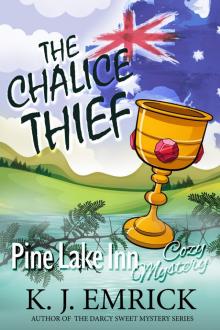 The Chalice Thief
The Chalice Thief As Long As There's Cake
As Long As There's Cake Murder Under the Mistletoe
Murder Under the Mistletoe A Cup of Death
A Cup of Death A Darcy Sweet Mystery Box Set Five
A Darcy Sweet Mystery Box Set Five Death by Chocolate Cake--A Short Read
Death by Chocolate Cake--A Short Read Murder Runs Deep
Murder Runs Deep Third Time's the Charm
Third Time's the Charm Murder, Wrapped Up
Murder, Wrapped Up Cast the First Stone
Cast the First Stone Speaks the Blue Jay
Speaks the Blue Jay How to Bake a Murder (A Cookie and Cream Cozy Mystery Book 1)
How to Bake a Murder (A Cookie and Cream Cozy Mystery Book 1)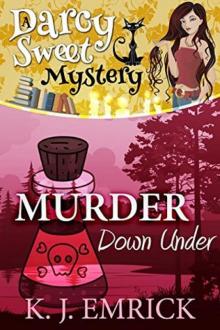 Murder Down Under
Murder Down Under The Getaway
The Getaway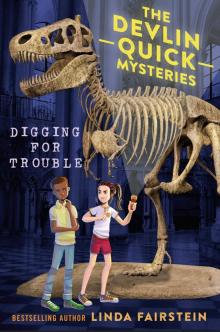 Digging For Trouble
Digging For Trouble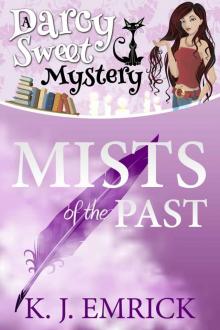 Mists of the Past (A Darcy Sweet Cozy Mystery #2)
Mists of the Past (A Darcy Sweet Cozy Mystery #2) 14 Christmas Spirit
14 Christmas Spirit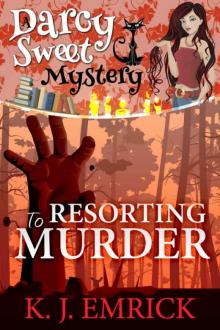 K.J. Emrick - Darcy Sweet 11 - Resorting to Murder
K.J. Emrick - Darcy Sweet 11 - Resorting to Murder How to Bake a Murder
How to Bake a Murder Mists of the Past
Mists of the Past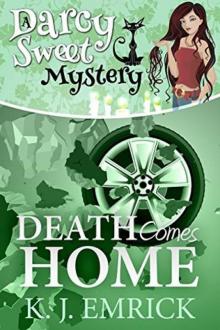 Death Comes Home
Death Comes Home K.J. Emrick - Darcy Sweet 13 - Ghost Story
K.J. Emrick - Darcy Sweet 13 - Ghost Story The Naughty List
The Naughty List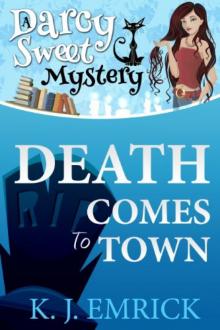 Death Comes to Town
Death Comes to Town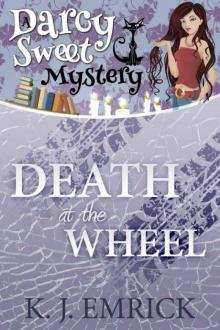 K.J. Emrick - Darcy Sweet 12 - Death at the Wheel
K.J. Emrick - Darcy Sweet 12 - Death at the Wheel Wine Astray: Spirit of the Soul Wine Shop Mystery (A Rysen Morris Mystery Book 1)
Wine Astray: Spirit of the Soul Wine Shop Mystery (A Rysen Morris Mystery Book 1) Doors, Danishes & Death
Doors, Danishes & Death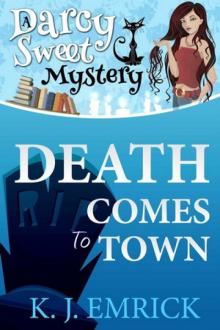 1 Death Comes to Town
1 Death Comes to Town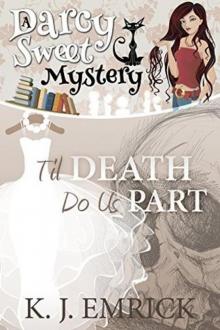 Til Death Do Us Part
Til Death Do Us Part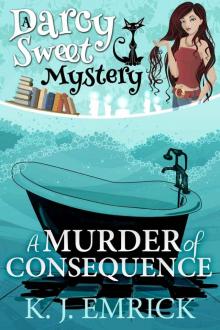 A Murder of Consequence (A Darcy Sweet Cozy Mystery Book 15)
A Murder of Consequence (A Darcy Sweet Cozy Mystery Book 15)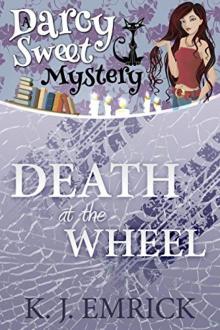 Death at the Wheel
Death at the Wheel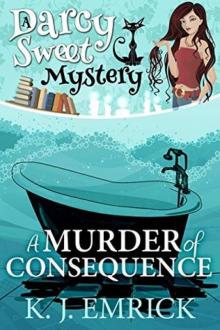 A Murder of Consequence
A Murder of Consequence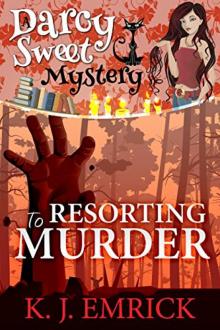 Resorting to Murder
Resorting to Murder Laid to Rest (A Darcy Sweet Cozy Mystery Book 18)
Laid to Rest (A Darcy Sweet Cozy Mystery Book 18) 4 The Ghost of Christmas
4 The Ghost of Christmas Doors, Danishes & Death (A Cookie and Cream Cozy Mystery Book 3)
Doors, Danishes & Death (A Cookie and Cream Cozy Mystery Book 3)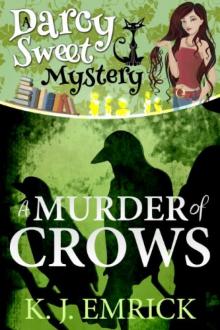 A Murder of Crows
A Murder of Crows Changes to the Recipe
Changes to the Recipe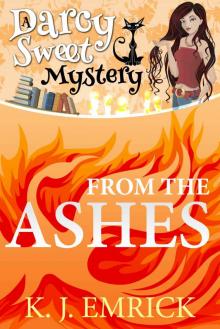 From the Ashes (A Darcy Sweet Cozy Mystery #3)
From the Ashes (A Darcy Sweet Cozy Mystery #3) Murder Down Under (A Darcy Sweet Cozy Mystery Book 17)
Murder Down Under (A Darcy Sweet Cozy Mystery Book 17) Family Secrets (A Darcy Sweet Cozy Mystery #8)
Family Secrets (A Darcy Sweet Cozy Mystery #8)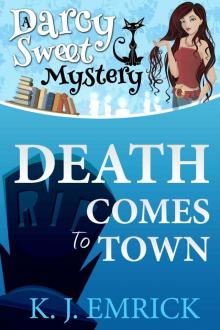 Death Comes to Town (A Darcy Sweet Cozy Mystery)
Death Comes to Town (A Darcy Sweet Cozy Mystery) Misty Hollow Cat Detective (Darcy Sweet Mystery) (A Smudge the Cat Mystery Book 1)
Misty Hollow Cat Detective (Darcy Sweet Mystery) (A Smudge the Cat Mystery Book 1) Changes to the Recipe (A Cookie and Cream Cozy Mystery Book 4)
Changes to the Recipe (A Cookie and Cream Cozy Mystery Book 4)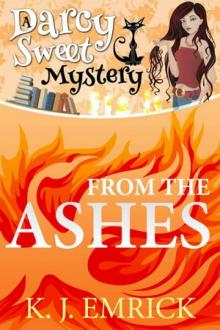 3 From the Ashes
3 From the Ashes Destination Murder
Destination Murder The Greatest Gift (A Darcy Sweet Mystery)
The Greatest Gift (A Darcy Sweet Mystery) Destination Murder (A Cookie and Cream Cozy Mystery Book 2)
Destination Murder (A Cookie and Cream Cozy Mystery Book 2) The Stolen Valentine
The Stolen Valentine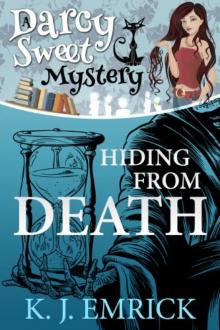 Hiding From Death
Hiding From Death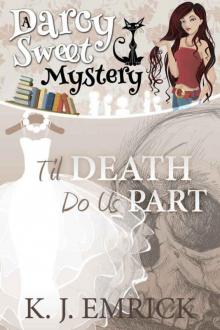 Til Death Do Us Part (A Darcy Sweet Cozy Mystery Book 16)
Til Death Do Us Part (A Darcy Sweet Cozy Mystery Book 16) Toxic Attack: Spirit of the Soul Wine Shop Mystery (A Rysen Morris Mystery Book 2)
Toxic Attack: Spirit of the Soul Wine Shop Mystery (A Rysen Morris Mystery Book 2)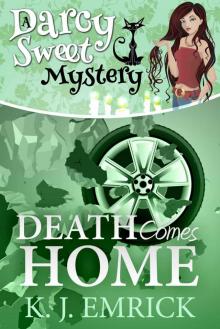 Death Comes Home (A Darcy Sweet Cozy Mystery Book 19)
Death Comes Home (A Darcy Sweet Cozy Mystery Book 19) Laid to Rest
Laid to Rest![Murder Down Under_[AN_Darcy Sweet] Read online](http://i1.bookreadfree.com/i2/04/08/murder_down_under_an_darcy_sweet_preview.jpg) Murder Down Under_[AN_Darcy Sweet]
Murder Down Under_[AN_Darcy Sweet] The Language of Death
The Language of Death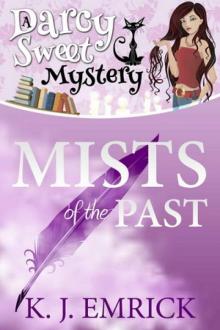 2 Mists of the Past
2 Mists of the Past The Ghost of Christmas (A Darcy Sweet Cozy Mystery #4)
The Ghost of Christmas (A Darcy Sweet Cozy Mystery #4)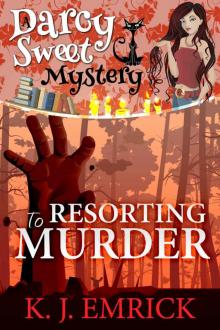 Resorting to Murder (A Darcy Sweet Mystery Book 11)
Resorting to Murder (A Darcy Sweet Mystery Book 11) Up In Smoke: Spirit of the Soul Wine Shop Mystery (A Rysen Morris Mystery Book 3)
Up In Smoke: Spirit of the Soul Wine Shop Mystery (A Rysen Morris Mystery Book 3) A Murder Spells Trouble
A Murder Spells Trouble The Ghost of Christmas
The Ghost of Christmas The Language of Death (A Darcy Sweet Coy Mystery)
The Language of Death (A Darcy Sweet Coy Mystery)